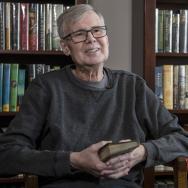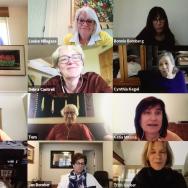Since he arrived at the University of Chicago last summer, Seth Green has been asking about dreams. As the new dean of the Graham School, the longtime educator wanted to build a vision for adult education that included input from everyone. No hopes, he insisted, would be too ambitious.
After meeting with hundreds of students, faculty and staff, Green and his team have created a strategic plan for growth. Along the way, he also gained deeper appreciation for the vibrant intellectual community at Graham and across UChicago.
“It’s been exhilarating to see how the University’s research is reshaping our understanding of the world, and then to think about how we can bring more of this groundbreaking knowledge to a broader group of learners through Graham’s educational programs,” Green said. “It’s been a lot of listening, a lot of awe and a lot of imagination.”
Appointed dean of the Graham School of Continuing Liberal and Professional Studies on July 1, 2021, Green leads efforts to provide comprehensive, interdisciplinary education for adult learners of all walks of life through four primary offerings: the Master of Liberal Arts; the Basic Program of Liberal Education; the Open Program; and the Writer’s Studio, as well as annual convenings and travel study programs.
Before joining Graham, Green served as founding director of the Baumhart Center for Social Enterprise and Responsibility at Loyola University Chicago. He previously led Youth & Opportunity United, a Chicago-area not-for-profit organization that helps low-income youth. He has also taught courses at Loyola’s Quinlan School of Business and at Northwestern University, and speaks and writes on social innovation.
In 2008, Utne Reader named him one of “50 Visionaries Who Are Changing Your World.” Green continues to advise a variety of local institutions and nonprofits, including the YWCA Metropolitan Chicago, Concordia Place and the Executives’ Club of Chicago.
In the following Q&A, Green discusses what he’s learned so far as dean, and the future he hopes to build for the Graham School.
You were named dean of the Graham School in July. What drew you to the role?
I was attracted to Graham’s distinctive approach to lifelong learning. At Graham, we believe passionately in the life of the mind, and we help learners engage in transformative education across their lives. That commitment to the life-enriching power of knowledge is an increasingly lost art, and I wanted to be a part of helping bring Graham’s vibrant and important mission to more individuals.
I also was attracted to the role because it meant being part of this amazing University. Graham focuses on extending the intellectual assets of the University of Chicago to all learners. The chance to engage with all of the groundbreaking ideas here that are shaping our world, and to think about how we bring those ideas to lifelong learners, was a thrilling proposition.
Why is the Graham School and its focus on adult learning important to the University’s mission?
Graham is one of the three founding divisions of the University. When William Rainey Harper [UChicago’s first president] was first imagining the University with [founder John D.] Rockefeller, they had a vision of being deeply connected to the local and global community. That commitment continues to this day with President Alivisatos’ vision of an “engaged university.” There’s always been a belief that the breakthrough ideas that begin at the University of Chicago don't end here—they reach beyond our campus and shape the world.
That vision includes bringing our distinctive education to learners who may not be able to reach our doors through traditional means. As early as 1895, Graham started distance learning. Students who couldn't make it to Chicago during parts of the year were able to use correspondence to earn credit. Over our history we've continued to be trailblazers in bringing learning to all.
Especially today, with the abundant demand for knowledge and the unprecedented opportunities to share it, our mission is more important and vibrant than ever.
Are there initial plans you can share about how you’d like to help Graham grow and evolve?
Big picture, our vision is to continue the extraordinary tradition that Graham has in the liberal arts, while complementing that tradition with timely programming in the sciences and in society, so that we build a comprehensive set of learning opportunities that reflect the University’s many disciplines and areas of thought leadership.
Our sense is that if we do that, we're going to see a few things happen: We're going to see significant growth in the number of learners who call Graham home. We're going to see a further diversification in the lived experiences of the individuals who call Graham home. And we're going to see a continued broadening of the geography of people who call Graham home. We're excited about how we can continue to bring the best of the University to lifelong learners and, in so doing, embrace a vibrant future that is built on Graham’s storied foundations.
How do you work with other schools and divisions across campus?
Everything we do at Graham is a partnership. Indeed, a lot of our work is focused on understanding where at the University there is both eminence and interest in engaging lifelong learners, and then determining how we can partner with those units to create shared value for them, for Graham, and for lifelong learners.
An example of this is the Novel Knowledge Series, a new partnership between the Graham School and UChicago’s Institute on the Formation of Knowledge (IFK) to bring timely, multidisciplinary courses to lifelong learners. Upcoming courses, for example, will explore how humans and machines relate to one another and how we have thought about planets in science and culture.
Another example is our new Scientific Discovery Program partnership with the Marine Biological Laboratory. MBL is one of the world’s great learning laboratories and it already has an array of educational programs. We’re now partnering with MBL to open its doors to lifelong learners through a scientific discovery program where learners will study with faculty across the University in an online forum, and then participate in a residency week at MBL in Woods Hole, Mass.
If faculty or staff in other areas of the University are interested in bringing their work to lifelong learners, we're eager to partner with them. Anyone with ideas should reach out to me or to Nikki Yagoda, our director of innovation and partnerships.
How did you become involved in youth-focused not-for-profits, and why is that important to you?
I'm incredibly passionate about the power of education and how it shapes our lives, including during our youth, and I've always been fascinated by the learning that takes place outside the traditional classroom, which may also be why I find myself so drawn to Graham.
My involvement in these organizations is also inspired by my own experience growing up. I was born with a cleft lip and palate, and I looked different and talked differently from other people until I had my final corrective surgery at age 19. I was fortunate to go to a camp designed for kids with birth differences and to have several other youth development experiences that helped give me confidence in my own skin and a sense of belonging that profoundly shaped my identity. As I thought about where I wanted to contribute to the world, I thought about all the incredible mentors and role models around me through those programs, and I was eager to be part of institutions that were helping to create those experiences, especially for young people who, because of the inequities of our world, might not otherwise have those opportunities. So, it was both a belief in the power of education, as well as a set of personal experiences, that led to my work with those organizations.
What has most inspired you in your first months at Graham?
The genuine love of learning here. When I first set foot at my undergraduate college, it was exhilarating. I had never before been in a place where learning was treated with such reverence. I felt at home being surrounded by faculty and peers who loved reading deeply and thinking creatively and asking big questions about the world.
At Graham, it’s been joyful to see rooms of people who are committed to that style of inquiry, and who want to be in a place of open exchange with one another in the shared pursuit of knowledge. To watch them all rigorously dig into ideas and to reconnect with many of the books that shaped how I look at the world and how I think about my own life has been incredibly meaningful, and it's reminded me of why liberal arts are so important for our lives and for our society.
I’m also very inspired by the University more broadly. There are so many big issues that we're looking at as citizens today, and it's amazing to be part of a universe where all those questions are being seriously engaged, where meaningful solutions are being designed, and where we're making significant progress in better understanding our world.

